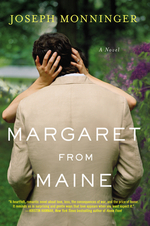 Joseph Monninger has published 11 novels, the latest of which is MARGARET FROM MAINE, and three nonfiction books. Here, Joseph remembers the copy of ROBINSON CRUSOE that belonged to his father and was prominently displayed on the bookshelf behind his father’s easy chair. It wasn’t so much the content that drew Joseph to Daniel Defoe’s classic, but the physical appearance of the book and everything it represented to him --- beauty, adventure, excitement, and the exotic.
Joseph Monninger has published 11 novels, the latest of which is MARGARET FROM MAINE, and three nonfiction books. Here, Joseph remembers the copy of ROBINSON CRUSOE that belonged to his father and was prominently displayed on the bookshelf behind his father’s easy chair. It wasn’t so much the content that drew Joseph to Daniel Defoe’s classic, but the physical appearance of the book and everything it represented to him --- beauty, adventure, excitement, and the exotic.
My father gave me his copy of Defoe’s ROBINSON CRUSOE sometime during the Christmas season when I was 10 or 11. We were not a reading family in the usual sense. As a sprawling Irish Catholic family with five boys and two girls, we were a loud, athletic quarrel, drawn to the television --- “Bonanza,” “Mission: Impossible,” “Gunsmoke,” who could resist? --- in the family den. But during the Christmas season, almost by silent consensus as the holiday approached, the television lost its power and the fireplace in the living room gathered us. We burned whatever tree branches had fallen down in our half acre of New Jersey suburb, and told stories about Christmases past, while on the record player --- never a decent stereo, alas --- Bing Crosby warbled out “Silent Night.”
My father worked in the shipping business in New York City. He was a Georgetown graduate, a major in the Army before he left it after World War II, a man whose true nature, it seems to me now, was much shier than what the world required of him. Now and then he talked to me about books. He talked, especially, of the books of his childhood --- THE CALL OF THE WILD, and the Horatio Hornblower series come to mind --- but the book that took rare place of prominence in his bookshelf behind his easy chair was ROBINSON CRUSOE.
If I’ve ever loved a book --- and I don’t mean the content, necessarily, but something more scalding and beautiful, something that seemed to emanate from the soft pages, the tree-scent of the cover --- then I loved that copy of ROBINSON CRUSOE. The cover was red-gold; the front cover image was of Crusoe himself, standing on his island, a strange, reed cap on his head, a pet parrot on his shoulder. The title, in embossed gold, ran across the bottom. I handled the book so often that I might have been able to pick it out of a hundred in a dark room using the title as braille.
 What did the book represent to me? Beauty, for one thing. Adventure, excitement, and the exotic. It took me years to read it, and I’m not sure I ever finished it. What I wanted from the book was what one wants from a sailor’s sea chest. Over and over I thumbed past the pictures --- Crusoe meeting Friday, the ships, the cannibals and mutineers, the home he made for himself with upright trees for a fence, the conical hat he wore to protect him from the sun. If we can live in books, then I can safely say I lived in that book. My father witnessed my disappearance. No one else in my family did.
What did the book represent to me? Beauty, for one thing. Adventure, excitement, and the exotic. It took me years to read it, and I’m not sure I ever finished it. What I wanted from the book was what one wants from a sailor’s sea chest. Over and over I thumbed past the pictures --- Crusoe meeting Friday, the ships, the cannibals and mutineers, the home he made for himself with upright trees for a fence, the conical hat he wore to protect him from the sun. If we can live in books, then I can safely say I lived in that book. My father witnessed my disappearance. No one else in my family did.
The book resided, however, on the important shelf behind his chair. It was a “good” book, valuable in some sense none of us ever examined. With seven children causing a rumpus, good books, or good china declared off limits to everyday use, proved a necessary precaution. And so at the end of each trip through Crusoe’s world, I returned the volume as I knew I should. Back in its slot, I could spot it in a moment. I knew the weight of it, the thick, tumbling weight of it as I edged it forward and received it, like a handshake or a dense box of cereal off a high self, when it came into my fingers.
Then one day my father told me I could keep it. Maybe it was the Christmas spirit, or maybe the book was not as valuable as I had imagined it to be, but he stopped me as I was putting it back and told me I could keep it in my room. In a family of seven, to have a special thing, to have a thing from one’s father --- one he endorsed and thought of as worthwhile --- was something rare and fine. I’ve often thought he saw something in me in that moment, and perhaps a part of himself as well. In various ways, he lived on his own small island, not entirely at home, perhaps, a Crusoe of self-exile rather than shipwreck.
Books take us to other lands, as anyone who reads knows full well, but --- not to strain a metaphor, I hope --- they are also islands of a sort. We travel to them and live by ourselves in a world invented for our temporary use. Part of the joy of that voyage is in discovering, upon one’s return or even while still there, that others have visited the island. We spot Friday’s immortal footprints in the sand and know we are not alone.
My dad died many years ago, and the copy of ROBINSON CRUSOE went on its own journey and is lost to me. I have not gone back to read the book in nearly half a century, and I am not sure what I would discover if I did. I suspect it would have profound racist elements abhorrent to a modern sensibility. (Novelist James Joyce noted that the symbol of the British Conquest is Robinson Crusoe: "He is the true prototype of the British colonist. …" The whole Anglo-Saxon spirit is in Crusoe: the manly independence, the unconscious cruelty, the persistence, the slow yet efficient intelligence, the sexual apathy, the calculating taciturnity.") But for one Christmas season, the novel glowed near my bed, a second world ready at my fingertips, an invitation to travel away and to visit a land that my father had visited before me.


